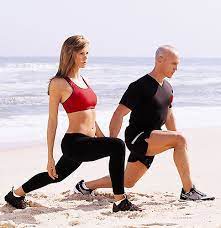Fitness guru David Kirsch breaks down the myths and truths around protein supplements and boys!
- David Kirsch
- Aug 9, 2021
- 4 min read
Updated: Aug 19, 2021

Roughly one-third of teenage boys want to "bulk" up, according to research by pediatricians at the University of California, San Francisco.
There are plenty of myths and truths that parents need to be aware of when a teenager wants to get on the protein train. Protein powders and shakes are being marketed to young boys more than ever, as kids get on social media. So how do we do this safely?
While protein is important for building new muscle, eating the right amount of protein is key. Consuming more protein than your body needs may translate to excess calories that must be stored, usually in the form of fat.
Too little protein consumption means your body has to supply it itself, which can result in muscle breakdown and loss. When you eat a balanced diet that includes enough calories and carbohydrates, your body won't use protein as a calorie source — it will spare it to build muscles and repair them when needed.
Parents should be careful when choosing supplements for their teenage sons. Some do come packed with harmful substances, and a few are on the banned list. And look out for experimental stimulant supplements! There's hidden stuff in some supplements, and if you need answers, ask your child's medical practitioner.
The COVID-19 pandemic saw a dramatic rise in global consumption of protein supplements - drinks and bars and statistics show this trend continuing to grow over the next decade, with global sales at $20 billion. Big tech plays a huge part in promoting supplements through advertising on social media, often by famous athletes, celebrities, and influencers. Platforms of choice include Facebook, Instagram, Tik Tok and YouTube. These celebrity endorsements extoll the myriad of benefits these protein supplements have becoming better at sports, or to look fitter on the beach, or ‘get the guy or girl!’ Make sure you vet them before allowing your child to consume them.
So, we know that protein is needed to support and promote the healthy development of your body - from infancy through adulthood. But, can too much protein consumption be harmful to your body? Simply said, YES!
Here are some basic facts - young athletes need a bit more protein than their peers who aren't working out as hard. Protein needs are based on age, sex, body weight and stage of development, with teens needing between 10 to 30% of their daily calories from protein. An individual’s exact needs will vary widely but the the Recommended Dietary Allowance (RDA) provides a good reference for how much of a certain nutrient a healthy individual needs in a day.
The RDA for protein is 46 grams for teenage girls and 52 grams for teenage boys. Most athletes are able to meet these protein requirements and then some. In fact, studies show that young athletes consume two to three times the RDA for protein! Although athletes may have higher protein needs than their peers, contrary to popular belief, consuming large amounts of protein does not build additional muscle. In fact, excessive protein is stored as fat in the body!
That’s not exactly what they tell you in those slick, highly produced, expensive ads touting the magical benefits of consuming these drinks. Additionally, some athletes wonder about using a protein supplement such as protein powder or a high-protein drink. Overall, this isn't necessary and even might be dangerous. Using protein supplements may lead to excessive protein intake, taxing the kidneys and promoting dehydration. Plus, the risk for contamination with steroids, hormones or other unwanted ingredients is real, as the safety of dietary supplements is largely left to manufacturers.
All that said, I believe that consuming protein supplements - drinks or bars, can be beneficial and help maintain a healthy, balanced diet, provided it is used as a supplement to an otherwise balanced daily diet. To make sure your teen is not getting more from the protein drinks and/or bars they are consuming, here are some helpful tips:
Most protein supplements are manufactured for adults, so if consumed by teens, I suggest the adage, “Less is More!” Read the nutritional fact label. If the suggested serving size is one scoop, and that translates into 20 - 25 grams of protein, I would suggest teens using 1/2 a scoop.
Make sure the protein drink is natural - free from artificial sweeteners, colors or additives; AND hormone-free. The last thing teens need in their developing bodies, are added artificial hormones raging through their bodies.
Ready -to -drink protein supplements often have more than you need or bargained for - too much protein, sugar, artificial additives and sweeteners, and calories. Additionally, they don’t satisfy your hunger causing them to be consumed with a meal and not as a supplement to a meal.
Don’t get me started on the healthfulness of protein bars - most are just glorified ‘candy bars,’ packed with sugar, calories, and lots of ingredients one doesn’t recognize or can pronounce.
READ THE NUTRITIONAL FACTS LABELS VERY CAREFULLY. Trips to the emergency room are not unheard of, not that I mean to scare parents and teens.
In summary, to maintain optimal health, teens should stick to consuming a balanced healthful diet - proteins, carbohydrates, vegetables, fruits, grains and healthy fats. When time doesn’t permit, and/or they are actively engaging in daily strenuous exercise, or competitive sports, protein supplements can be beneficial, but choose them wisely and expeditiously.
And as always, we believe that any new diet regimen or exercise program should be given the green light by your child's pediatrician, especially if it involves competitive sports or if your child is an elite athlete. Children are still developing and every young body has differing needs. So always consult the medical expert!
https://kidshealth.org/en/teens/eatnrun.html
https://www.aappublications.org/news/2016/06/27/PED062716









Comments